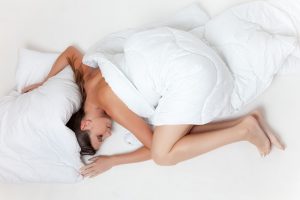-
-
(03) 9484 3434

What is the best sleeping posture?

There’s a lot of information out there that recommend sleeping on your back as the healthiest position. Or that stomach sleepers put pressure on their muscles and joints, leading to a range of problems. Well that’s not quite true.
Dr Buttigieg comments, “Most people should be able to sleep whichever way they want and it shouldn’t be a problem. Ligaments and the connecting tissues in your body are very tough. Which means that people should choose whatever pose feels comfortable. The worst thing to do is to try and adopt a rigid position. That is a recipe for poor sleep hygiene. A nervous system that is active all night will contribute to maintaining tension and stress levels that increase the potential for problems.”
“Changing one’s natural sleeping position is quite difficult. We are creatures of habit as they say. You may go to sleep in one position, but during the night most sleepers will invariably revert to the pose they have used for most of their lives.”
What if I suffer from chronic pain or an injury
“There’s no doubt that different positions have different benefits and disadvantages that will impact any pain, injury or condition you may have. Trying to change your posture maybe necessary, but also look at ways to accommodate your current sleeping posture”, says Dr Buttigieg.
If you naturally sleep in a foetal position make sure it’s a fairly loose rather than a rigid position. Make sure you’re loose and relaxed when you curl up at night, where your knees aren’t crunched up close to your chest. If you sleep on your side and have back problems – try placing a firm pillow between your knees. This will help prevent pulling your spine out of alignment and reduce stress on your hips and lower back.
For those that sleep on their back, a small pillow under the knees can reduce pressure on the spine as well as supporting the natural of the lower back.
Dr Buttigieg comments, “Choosing the right pillow and mattress combination will have a significant impact on how well your body is supported while sleeping. Selecting the right pillow for your head should help keep your spine and body straight.”
PERFECT REST IS BEST
At Beck’s Bedding, we have over 70 years of manufacturing experience and all our mattresses are custom made to order. We understand that everyone is different and not one mattress is best, or suits all. That is why we will make a mattress to suit you! This will help you sleep better and let you enjoy life. Visit our showroom located at 323 - 329 Bell Street, PRESTON and find out how you can sleep better.
